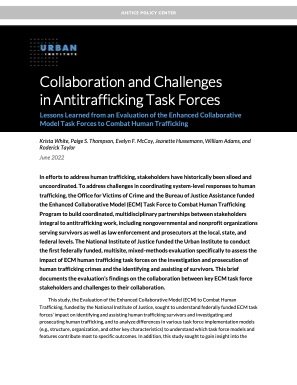Collaboration and Challenges in Antitrafficking Task Forces. Lessons Learned from an Evaluation of the Enhanced Collaborative Model Task Forces to Combat Human Trafficking
By Krista White, Paige S. Thompson, Evelyn F. McCoy, Jeanette Hussemann, William Adams, and Roderick Taylor
In efforts to address human trafficking, stakeholders have historically been siloed and uncoordinated. To address challenges in coordinating system-level responses to human trafficking, the Office for Victims of Crime and the Bureau of Justice Assistance funded the Enhanced Collaborative Model (ECM) Task Force to Combat Human Trafficking Program to build coordinated, multidisciplinary partnerships between stakeholders integral to antitrafficking work, including nongovernmental and nonprofit organizations serving survivors as well as law enforcement and prosecutors at the local, state, and federal levels. The National Institute of Justice funded the Urban Institute to conduct the first federally funded, multisite, mixed-methods evaluation specifically to assess the impact of ECM human trafficking task forces on the investigation and prosecution of human trafficking crimes and the identifying and assisting of survivors. This brief documents the evaluation’s findings on the collaboration between key ECM task force stakeholders and challenges to their collaboration.
Washington DC: Urban Institute, 2022. 14p.


